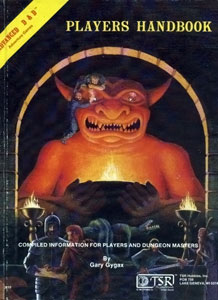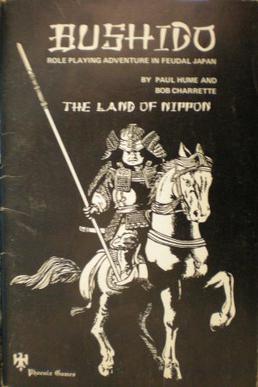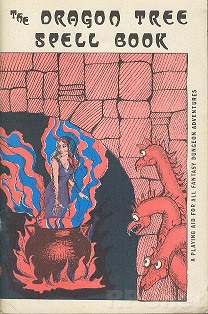 | |
| Illustrators | Bob Charrette |
|---|---|
| Writers | Dan Bress, Ed Konstant |
| Publishers | Little Soldier Games |
| Publication | 1977 |
| Genres | Role-playing |
The Book of Sorcery is a supplement for fantasy role-playing games published by Little Soldier Games in 1977.
 | |
| Illustrators | Bob Charrette |
|---|---|
| Writers | Dan Bress, Ed Konstant |
| Publishers | Little Soldier Games |
| Publication | 1977 |
| Genres | Role-playing |
The Book of Sorcery is a supplement for fantasy role-playing games published by Little Soldier Games in 1977.
The Book of Sorcery is a supplement presenting rules for spell-casting and incantations for use with spells, as well as new artifacts and magic items. [1]
Little Soldier Games was founded in 1975 by Ed Konstant and David Perez. After an abortive attempt at a role-playing game based on J.R.R. Tolkien's The Lord of the Rings and an Arthurian role-playing game called Knights of the Round Table , Konstant and Perez decided to supply third-party supplements for the new role-playing game Dungeons & Dragons . After publishing The Book of Monsters and The Book of Demons in 1976, they released The Book of Sorcery in 1977. It was a digest-sized 44-page book, written by Dan Bress and Ed Konstant. The illustrations and cover art were done by Bob Charrette. [2] : 130
In 1978, Phoenix Games bought Little Soldier Games, and signed over the rights to the Little Soldier back-catalogue to Gamescience after Gamescience paid the printing costs for Phoenix's first two products. [2] : 294 Gamescience later included The Book of Sorcery in the 1990 compilation The Fantasy Gamer's Compendium. [1]
Lew Pulsipher reviewed The Book of Sorcery for White Dwarf #5, and stated that "Book of Sorcery is much too short for [the price]." [3]

RuneQuest is a fantasy tabletop role-playing game originally designed by Steve Perrin, Ray Turney, Steve Henderson, and Warren James, and set in Greg Stafford's mythical world of Glorantha. It was first published in 1978 by The Chaosium. Beginning in 1984, publication passed between a number of companies, including Avalon Hill, Mongoose Publishing, and The Design Mechanism, before finally returning to Chaosium in 2016. RuneQuest is notable for its system, designed around percentile dice and an early implementation of skill rules, which became the basis for numerous other games. There have been several editions of the game.

Arduin is a fictional universe and fantasy role-playing system created in the mid-1970s by David A. Hargrave. It was the first published "cross-genre" fantasy RPG, with everything from interstellar wars to horror and historical drama, although it was based primarily in the medieval fantasy genre.

The Player's Handbook is the name given to one of the core rulebooks in every edition of the fantasy role-playing game Dungeons & Dragons (D&D). It does not contain the complete set of rules for the game, and only includes rules for use by players of the game. Additional rules, for use by Dungeon Masters (DMs), who referee the game, can be found in the Dungeon Master's Guide. Many optional rules, such as those governing extremely high-level players, and some of the more obscure spells, are found in other sources.

Bushido is a Samurai role-playing game set in Feudal Japan, originally designed by Robert N. Charrette and Paul R. Hume and published originally by Tyr Games, then Phoenix Games, and subsequently by Fantasy Games Unlimited. The setting for the game is a land called Nippon, and characters adventure in this heroic, mythic, and fantastic analogue of Japan's past.

Owl and Weasel was a newsletter for board gamers, role-playing gamers and wargamers, published in London, England, by Games Workshop. A total of 25 issues were published from February 1975 until April 1977; it was edited by Steve Jackson and Ian Livingstone. It was superseded by White Dwarf.

High Fantasy is a fantasy role-playing game system originally published by Fantasy Productions in 1978. A second edition in 1981 and several subsequent books were published by Reston Publishing that featured solo adventures using the High Fantasy system. The game received mixed reviews in game periodicals including White Dwarf, The Space Gamer, Different Worlds, Ares, and Dragon.
Lewis Errol Pulsipher, often credited as Lew Pulsipher, is an American teacher, game designer, and author, whose subject is role playing games, board games, card games, and video games. He was the first person in the North Carolina community college system to teach game design classes, in fall 2004. He has designed half a dozen published boardgames, written more than 150 articles about games, contributed to several books about games, and presented at game conventions and conferences.
The Red Book is a trademark of Gamestuff Inc and an unauthorized edition of Chivalry & Sorcery (C&S) role playing game. Its name comes from the red cover of the official first edition. All successive Red Book editions took the same design. Editions of Red Book after the first are named in addition to numbered: Phoenix (2nd), Chimera (3rd), Gorgon (4th), Manticore (5th), Hydra (6th) and Minotaur (7th). Red Book preserves the cover and typeface of the first edition of C&S. C&S was originally created in 1977 by two Canadian game designers, Edward E. Simbalist and Wilf K. Backhaus, and first published by Fantasy Games Unlimited (FGU), an American editor. The second edition was also published by FGU (1983), the third by Highlander Designs (1996), the fourth (2000) and the fifth (2020) by Britannia Game Designs, an English editor.
Thieves' Guild is a fantasy role-playing game published by Gamelords in 1980.

Knights of the Round Table is a role-playing game published by Little Soldier Games in 1976.
Little Soldier Games was an American game company that produced role-playing games and game supplements.
Phoenix Games was an American game company that produced role-playing games and game supplements.

Dragon's Hall is a supplement for fantasy role-playing games published by Judges Guild in 1981.

Nomad Gods is a fantasy wargame designed by Greg Stafford, and published by Chaosium in 1977. A French-language edition was published by Oriflam under license from Chaosium under the name Les Dieux Nomades in 1994. A free version for online play without the rulebook was released for the Vassal Engine in 2012. Chaosium republished the rulebook in PDF format in 2017.

Thieves' Guild 2 is a 1980 role-playing game supplement published by Gamelords for Thieves' Guild.

The Free City of Haven is a campaign setting published by Gamelords in 1981 that can be used with any role-playing game rules, including Gamelords's own fantasy role-playing game Thieves' Guild.

The Dragon Tree Spell Book is a 1981 fantasy role-playing game supplement published by Dragon Tree Press.

The Book of Monsters is a supplement for fantasy role-playing games published by Little Soldier Games in 1976.

The Book of Demons is a supplement published by Little Soldier Games in 1976 for fantasy role-playing games.